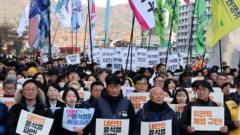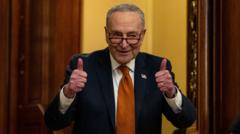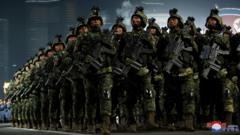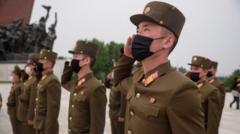The unfolding political crisis emerged after President Yoon declared martial law, only to retract the decision hours later following intense opposition.
South Korea's Opposition Moves to Impeach President Yoon Following Martial Law Controversy

South Korea's Opposition Moves to Impeach President Yoon Following Martial Law Controversy
Amid widespread protests, South Korea's opposition has initiated impeachment proceedings against President Yoon Suk Yeol over his controversial martial law declaration.
South Korea's opposition party has taken decisive steps to impeach President Yoon Suk Yeol following a dramatic turn of events surrounding his martial law declaration. This motion, spearheaded by the Democratic Party, highlights growing discontent among lawmakers and citizens over the administration’s perceived authoritarian actions. As protests erupted across the nation, citizens took to the streets demanding Yoon's resignation, chanting calls for his arrest.
The situation escalated on Wednesday, when President Yoon's initial move to impose martial law triggered a swift response from the National Assembly where 190 lawmakers voted against the order within hours. The Democratic Party has labeled Yoon's actions as "insurrectionary behaviour" and seeks to charge him along with his ministers for their roles in the declaration.
Kim Yong-jin from the Democratic Party emphasized the need to protect democracy and the safety of citizens, asserting that such actions should not be tolerated. In a notable moment, sizeable protests were observed, with citizens fiercely expressing their dissent and demanding a climate of political accountability.
In the aftermath of the chaotic scene, which saw troops converge on parliament and violent confrontations erupt, Minister of Defence Kim Yong-hyun stepped down, taking full responsibility for the turmoil unleashed by the martial law declaration.
Yoon, who has faced record low approval ratings, cited concerns regarding North Korean influence as motivations for his drastic measures. Despite offering a retraction, international allies, including the US, reacted with alarm, stressing the importance of maintaining democratic norms.
As the opposition gears up for an impeachment vote that requires a two-thirds majority in the National Assembly, questions surrounding Yoon's authority and future in office become more pressing. The outcome of this political standoff could reshape South Korea's leadership landscape and prompt a potential election in the coming months, while the country's history with martial law looms large over this unfolding saga.
The situation escalated on Wednesday, when President Yoon's initial move to impose martial law triggered a swift response from the National Assembly where 190 lawmakers voted against the order within hours. The Democratic Party has labeled Yoon's actions as "insurrectionary behaviour" and seeks to charge him along with his ministers for their roles in the declaration.
Kim Yong-jin from the Democratic Party emphasized the need to protect democracy and the safety of citizens, asserting that such actions should not be tolerated. In a notable moment, sizeable protests were observed, with citizens fiercely expressing their dissent and demanding a climate of political accountability.
In the aftermath of the chaotic scene, which saw troops converge on parliament and violent confrontations erupt, Minister of Defence Kim Yong-hyun stepped down, taking full responsibility for the turmoil unleashed by the martial law declaration.
Yoon, who has faced record low approval ratings, cited concerns regarding North Korean influence as motivations for his drastic measures. Despite offering a retraction, international allies, including the US, reacted with alarm, stressing the importance of maintaining democratic norms.
As the opposition gears up for an impeachment vote that requires a two-thirds majority in the National Assembly, questions surrounding Yoon's authority and future in office become more pressing. The outcome of this political standoff could reshape South Korea's leadership landscape and prompt a potential election in the coming months, while the country's history with martial law looms large over this unfolding saga.




















